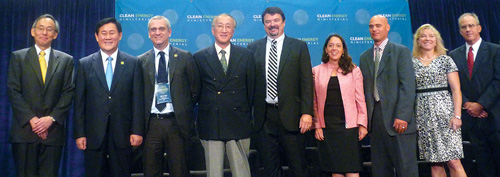Clean Energy Ministerial in Washington
Adopts 11 initiatives to spread clean energy

Minister of Knowledge Economy Choi Kyung-hwan participated in the first Clean Energy Ministerial (CEM) held in Washington, D.C., from July 19-20 and introduced Korea¡¯s successful practices on green growth policies.
Energy ministers from 22 nations participated in the ministerial including the United States, the United Kingdom, China, Japan and Korea. Among those on hand at the CEM was the International Energy Agency Executive Director Nobuo Tanaka, making the CEM a kind of ¡°G-20 energy summit.¡± Only the ministers participated in meetings held on July 19 and civilians were allowed to participate in the meeting held on July 20.
The ministerial adopted 11 initiatives to proliferate clean energy, said Kang Nam-hoon, director general for energy policy at the Ministry of Knowledge Economy (MKE). Specifically, the initiatives include such new and renewable energy sources as photovoltaic power and wind power, smart grid, carbon capture, use and storage (CCUS) and green cars.
MKE Minister Choi participated in the discussions of the July 19 sessions and stressed the need for promoting international collaboration for proliferating the smart grid Korea is now initiating. Choi announced a plan to inaugurate the International Smart Grid Action Network (ISGAN) on July 20.
Minister Choi held bilateral meetings with U.S. Energy Secretary Steven Chu and Brazil¡¯s energy minister Marcio Zimmermann on the sidelines of the CEM on July 19 and discussed ways of promoting cooperation in the energy sector between the countries and building clean energy partnerships.
Energy R&D Innovation, Solutions for Reducing GHGs
The Ministry of Knowledge Economy (MKE) held a session to invite International Energy Agency Executive Director Nobuo Tanaka and announce the Energy Technology Perspective (ETP) 2010 at the Lotte Hotel in downtown Seoul on July 16.
Organized by the Korea Institute of Energy Technology Evaluation and Planning (KETEP) and hosted by the MKE, the session attracted about 200 energy experts from industry, academia and research circles, including MKE Vice Minister Kim Young-hak and KETEP President Lee Joon-hyun.
The IEA biennially publishes Energy Technology Perspectives. The session consisted of an opening ceremony and a lecture by IEA Executive Director Tanaka on ETP 2010 and a panel discussion with five Korean and foreign energy experts.
MKE Vice Minister Kim said in a commemorative speech, ¡°Energy technology innovation is a key for determining the success or failure of green growth, and we¡¯ll concentrate on the expansion of green energy technology R&D investments and building industrial infrastructure so that the nation can get a jump-start in the hotly contested ¡®Green Race.¡¯¡± Tanaka said in a keynote speech, ¡°Globally, energy technology innovation is proceeding at a faster clip, but dramatic additional investments are essential to cut down on CO2 in the long-term perspective.¡± He predicted that in the short-term, an improvement of energy efficiency and in the mid- and long-term perspective, the spread of new and renewable energy, nuclear energy and carbon capture and storage (CCS) and electric cars and other transportation technology innovations will take center stage.
A panel discussion session chaired by Prof. Sohn Jae-ik of Seoul National University of Technology was attended by five Korean and foreign experts including Doosan Heavy Industries and Construction Co. CTO Choi Seung-joo and Bartel Korea CTO Kannberg. They had in-depth discussions on the evaluation of the ETP 2010, national R&D strategies and policy direction as well as the building of infrastructure.
According to ETP 2010, if the current policies continue to hold, almost all energy needs will be filled by fossil fuels, and CO2 emissions are forecast to amount to 57Gt in 2050, twice the current levels, which falls short of the 62Gt in 2050 predicted by ETP 2008. The ¡°Blue Map Scenario,¡± which calls for halving CO2 emissions by 2050 indicates that the global crude oil peak will happen between 2030 and 2035. It stresses the need for much more research and investment since 46 percent of primary energy needs are derived from fossil fuels.
Meanwhile, the cost for halving CO2 reductions by 2050 was predicted to be $46 trillion more than the Baseline Scenario¡¯s $270 trillion, but it is likely to be cost-effective since the accumulative energy reduction is forecast to be worth $112 trillion. nw
Korean Minister of Knowledge Economy Choi Kyung-hwan and other energy ministers from 11 nations pose for a group photo during the first Clean Energy Ministerial in Washington, D.C. recently.
3Fl, 292-47, Shindang 6-dong, Chung-gu, Seoul, Korea 100-456
Tel : 82-2-2235-6114 / Fax : 82-2-2235-0799